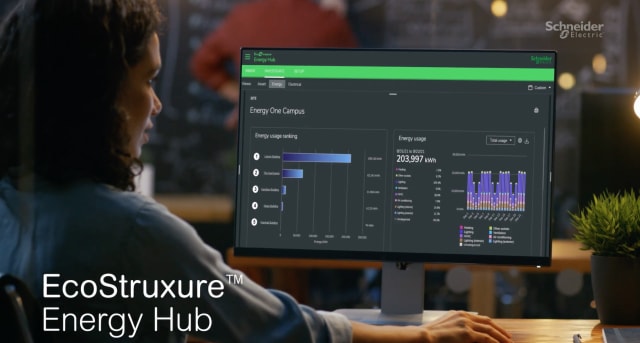
Schneider Electric’s EcoStruxure Energy Hub. (Source: Schneider Electric.)
Amid an energy and climate crisis, Schneider Electric is capitalizing on the current momentum around building electrification with the release of several new products to increase energy efficiency.
At the recent annual North American Innovation Summit, the digital transformation and energy management company announced products to accelerate sustainability by reducing emissions in commercial buildings, homes, infrastructure and data centers. The aim is to push toward a net-zero goal in which the built environment doesn’t contribute any net greenhouse gas emissions into the environment. However, to achieve this, buildings need to become more energy efficient, be powered by on-site renewable energy, or be connected to energy grids powered by primarily renewable energy. Some estimate that such steps could reduce U.S. emissions by almost 57 percent.
Schneider Electric announced the following energy-efficiency offerings:
Wiser Smart Panel Retrofit Solution: A product geared toward making homes more efficient by monitoring and controlling all circuits on one platform and ensuring that they’re only used when needed. It can be installed in a home’s electric panel, enabling residents to track their energy usage in real time, reduce consumption and save money.
EvoPacT: For large facilities, this vacuum circuit breaker integrates building health monitoring sensors for advanced monitoring capabilities like items related to predictive maintenance reducing the risk of downtime and performing control and monitoring functions outside of the arc flash zone.
ArcBlok 2500: This technology helps protect buildings and their inhabitants by preventing, isolating and migrating arc flash events. It reduces the likelihood of an arc flash event occurring and lifts the incident energy exposure for electrical systems using a passive design with a low carbon footprint.
RIB Carbon Quantifier: Decarbonization efforts can’t be tracked without data. This product helps real estate developers extract and quantify embodied carbon data quickly and efficiently using information from leading environmental product declarations (EPD) databases and provides predictive modeling for how building plans will contribute to or reduce carbon emissions.
EcoStruxure Energy Hub: This all-in-one platform for electrical infrastructure and software allows businesses to advance net-zero goals by providing them with real-time energy status reports and immediately signaling alarms when energy use goes off course. it also helps building managers optimize maintenance activities and remain in energy code compliance.
EcoCare: This product is a subscription-based service for data centers that helps customers assess the lifecycle cost of facility equipment. It assists customers with optimizing building maintenance and provides the best recommendations to increase system and operational performance and overall energy management.
EcoStruxure Power and Process: Geared for factories, this product combines data from electrical and automation systems to help a facility’s assets work in conjunction toward enhanced efficiency. It integrates with ETAP energy management software solutions that design, operate and automate power systems.
Advanced Electric Design for Autodesk Revit by BIM Electric: An advanced BIM-based electrical design solution integrates with Revit to create a more complete BIM solution connecting teams, data and workflows across project lifecycles. The latest software feature allows for simplified electrical planning, design and analysis.
“Helping businesses and governments deliver on their sustainability commitments is the focal point of our work,” said Aamir Paul, president of Schneider Electric North America, in the company’s news release. “The launch of these new energy-efficient products and solutions, alongside the essential conversations of Innovation Summit North America, brings us a critical step closer to achieving a more sustainable and resilient future.”
The timing of Schneider’s announcement of these tools coincides with the U.S. federal government passing the Inflation Reduction Act, which provides unprecedented tax incentives for home and commercial building energy-efficiency upgrades. Some estimate that the legislation will catalyze a total of $800 billion in government spending on climate-related upgrades, including building electrification. Such incentives will be pivotal for companies like Schneider Electric that are already experienced in working toward building electrification and energy efficiency.
